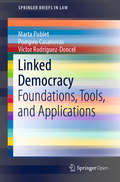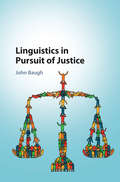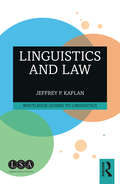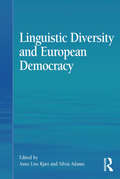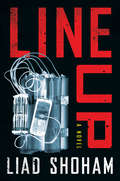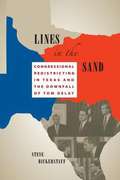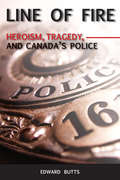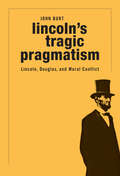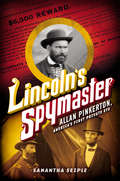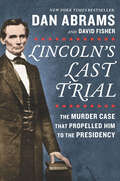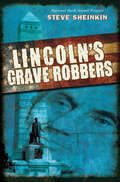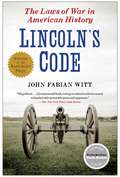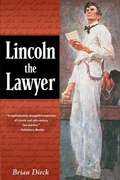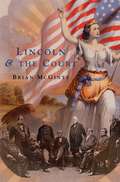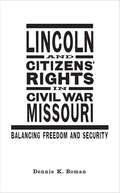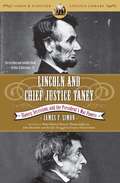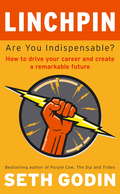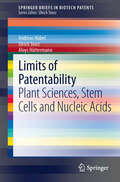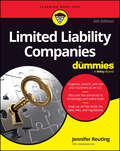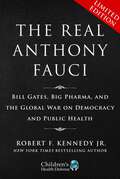- Table View
- List View
LinkedIn® In One Hour for Lawyers
by Dennis Kennedy Allison C. ShieldsLawyers work in a world of networks, connections, referrals, and recommendations. For many lawyers, the success of these networks determines the success of their practice. LinkedIn®, the premier social networking tool for business, can help you create, nurture, and expand your professional network and gain clients in the process. LinkedIn® in One Hour for Lawyers provides an introduction to this powerful tool in terms that any attorney can understand
Linked Democracy: Foundations, Tools, and Applications (SpringerBriefs in Law)
by Marta Poblet Pompeu Casanovas Víctor Rodríguez-DoncelThis open access book shows the factors linking information flow, social intelligence, rights management and modelling with epistemic democracy, offering licensed linked data along with information about the rights involved. This model of democracy for the web of data brings new challenges for the social organisation of knowledge, collective innovation, and the coordination of actions. Licensed linked data, licensed linguistic linked data, right expression languages, semantic web regulatory models, electronic institutions, artificial socio-cognitive systems are examples of regulatory and institutional design (regulations by design). The web has been massively populated with both data and services, and semantically structured data, the linked data cloud, facilitates and fosters human-machine interaction. Linked data aims to create ecosystems to make it possible to browse, discover, exploit and reuse data sets for applications. Rights Expression Languages semi-automatically regulate the use and reuse of content.
Linguistics in Pursuit of Justice: Colorblind Ambition
by John BaughAs a black child growing up in inner-city neighborhoods in Philadelphia and Los Angeles, John Baugh witnessed racial discrimination at a young age and began to notice correlations between language and race. While attending college he worked at a Laundromat serving African Americans who were often subjected to mistreatment by the police. His observations piqued his curiosity about the ways that linguistic diversity might be related to the burgeoning Civil Rights movement for racial equality in America. Baugh pursued these ideas whilst traveling internationally only to discover alternative forms of linguistic discrimination in Europe, Africa, Asia, Australia, the Caribbean and South America. He coined the phrase 'linguistic profiling' based on experimental studies of housing discrimination, and expanded upon those findings to promote equity in education, employment, medicine and the law. This book is the product of the culmination of these studies, devoted to the advancement of equality and justice globally.
Linguistics and Law (Routledge Guides to Linguistics)
by Jeffrey P. KaplanLinguistics and Law offers a clear and concise introduction to making sense of the law through linguistics. Drawing on lexical semantics, syntax, and pragmatics to interpret both written and spoken laws, this book: addresses how to interpret legal documents such as contracts, statutes, constitutional provisions and trademarks; provides thorough analyses of "language crimes" including solicitation, perjury, defamation, and conspiracy, as well as talk between police and criminal suspects; analyzes the Miranda warning in depth; tackles the question of whether there is a "language" of the law; draws on real-life case studies to aid understanding. Written in an approachable, conversational style and aimed at undergraduate students with little or no prior knowledge of linguistics or law, this book is essential reading for those approaching this topic for the first time.
Linguistic Diversity and European Democracy
by Anne Lise Kjær Silvia AdamoWhat role does linguistic diversity play in European democratic and legal processes? Is it an obstacle to deliberative democracy and a hindrance to legal certainty, or a cultural and economic asset and a prerequisite for the free movement of citizens? This book examines the tensions and contradictions of European language laws and policy from a multi-disciplinary perspective. With contributions from leading researchers in EU law and legal theory, political science, sociology, sociolinguistic and cognitive linguistics, it combines mutually exclusive and competing perspectives of linguistic diversity. The work will be a valuable resource for academics and researchers in the areas of European law, legal theory and linguistics.
Lineup
by Liad ShohamInternational bestselling author Liad Shoham makes his American debut in this compelling, superbly plotted crime thriller. After a brutal rape disturbs a quiet Tel Aviv neighborhood, baffled detectives find no clues, no eyewitnesses, and no suspects. The father of the shattered victim refuses to rest until justice is done, so he begins his own investigation. Keeping watch over his daughter's apartment from the street, he notices Ziv Nevo lurking in the shadows. All circumstances--and the victim--point to Nevo's guilt, and it appears the case is closed. But appearances can be deceiving. Detective Eli Nachum is eager to wrap up this high-profile case, which threatens to thwart his career. He sees an easy conviction when the father, determined to succeed where the police have failed, hands over Nevo. But why does the suspect keep silent during the interrogation? What secret is he hiding? What should Nachum and the idealistic young district attorney understand from the suspect's silence?What unfolds is a brilliant, fast-paced story that will keep you guessing until the very last page. Lineup is a twisted tale of mistaken identity, organized crime, a disgraced detective looking for redemption, a tireless young reporter, and an innocent man with a not-so-innocent past. Which lines will they cross and what will they be willing to risk, as their worlds begin to collapse? This seamless, gripping novel introduces a powerful new voice in crime fiction.
Lines in the Sand
by Steve BickerstaffThe events of 2003 in Texas were important to the political history of this country. Congressman Tom DeLay led a Republican effort to gerrymander the state's thirty-two congressional districts to defeat all ten of the Anglo Democratic incumbents and to elect more Republicans; Democratic state lawmakers fled the state in an effort to defeat the plan. The Lone Star State uproar attracted attention worldwide. The Republicans won this showdown, gaining six additional seats from Texas and protecting the one endangered Republican incumbent. This outcome has undeniably affected national policy-making and has made it more difficult for Democrats to regain a majority in the U. S. House of Representatives. Some of the methods used by DeLay to achieve this result, however, led to his criminal indictment and ultimately to his downfall. With its eye-opening research, readable style, and insightful commentary, Lines in the Sand provides a front-line account of what happened in 2003, often through the personal stories of members of both parties and of the minority activist groups caught in a political vortex. Law professor Steve Bickerstaff provides much-needed historical perspective and also probes the aftermath of the 2003 redistricting, including the criminal prosecutions of DeLay and his associates and the events that led to DeLay's eventual resignation from the U. S. House of Representatives.
Line of Fire: Heroism, Tragedy, and Canada's Police
by Edward ButtsAcross Canada peace officers put their lives on the line every day. From John Fisk in 1804, the first known Canadian policeman killed in the line of duty, to the four RCMP officers shot to death in Mayerthorpe, Alberta, in 2005, renowned true crime writer Edward Butts takes a hard-hitting, compassionate, probing look at some of the stories involving the hundreds of Canadian law-enforcement officers who have found themselves in harm’s way. Some, like the four RCMP officers who perished in the Northwest Territories on the "Lost Patrol" of 1910, died in horrible accidents while performing their duties. Others, such as the Mounties involved in the manhunts for Almighty Voice and the Mad Trapper of Rat River, found themselves in extremely dangerous, violent situations. One thing is certain about all of these peace officers: they displayed amazing courage and never hesitated to make the ultimate sacrifice for their fellow citizens.
Lindy Chamberlain: The Full Story
by Ken CrispinThe true story of a mother accused of murdering her baby in the outback of Australia.
Lincoln's Tragic Pragmatism: Lincoln, Douglas, and Moral Conflict
by John BurtA New York Times Book Review Editors’ ChoiceIn 1858, challenger Abraham Lincoln debated incumbent Stephen Douglas seven times in the race for a U.S. Senate seat from Illinois. More was at stake than slavery in those debates. In Lincoln’s Tragic Pragmatism, John Burt contends that the very legitimacy of democratic governance was on the line. In a United States stubbornly divided over ethical issues, the overarching question posed by the Lincoln-Douglas debates has not lost its urgency: Can a liberal political system be used to mediate moral disputes? And if it cannot, is violence inevitable?“John Burt has written a work that every serious student of Lincoln will have to read...Burt refracts Lincoln through the philosophy of Kant, Rawls and contemporary liberal political theory. His is very much a Lincoln for our time.”—Steven B. Smith, New York Times Book Review“I'm making space on my overstuffed shelves for Lincoln’s Tragic Pragmatism. This is a book I expect to be picking up and thumbing through for years to come.”—Jim Cullen, History News Network“Burt treats the [Lincoln-Douglas] debates as being far more significant than an election contest between two candidates. The debates represent profound statements of political philosophy and speak to the continuing challenges the U.S. faces in resolving divisive moral conflicts.”—E. C. Sands, Choice
Lincoln's Spymaster: Allan Pinkerton, America's First Private Eye
by Samantha SeipleFrom Samantha Seiple, the award winning author of Ghosts in the Fog, comes the first book for young adults to tell the story of Allan Pinkerton, America's first private eye.Lincoln's Spymaster tells the dangerous and action-packed adventures of Allan Pinkerton, America's first private eye and Lincoln's most trusted spymaster.Pinkerton was just a poor immigrant barrel-maker in Illinois when he stumbled across his first case just miles from his home. His reputation grew and people began approaching Pinkerton with their cases, leading him to open the first-of-its-kind private detective agency. Pinkerton assembled a team of undercover agents, and together they caught train robbers, counterfeiters, and other outlaws. Soon these outlaws, including Jesse James, became their nemeses. Danger didn't stop the agency! The team even uncovered and stopped an assassination plot against president-elect Abraham Lincoln! Seeing firsthand the value of Pinkerton's service, Lincoln funded Pinkerton's spy network, a precursor to the Secret Service. Allan Pinkerton is known as the father of modern day espionage, and this is the first book for young adults to tell his story!
Lincoln's Political Thought
by George KatebAt the center of Lincoln's political thought and career is an intense passion for equality that runs so deep in the speeches, messages, and letters that it has the force of religious conviction for Lincoln. George Kateb examines these writings to reveal that this passion explains Lincoln's reverence for both the Constitution and the Union.
Lincoln's Last Trial: The Murder Case That Propelled Him to the Presidency
by David Fisher Dan AbramsThe award-winning, New York Times–bestselling chronicle of the sensational murder trial that would be the capstone of Lincoln’s legal career.In the summer of 1859, twenty-two-year-old “Peachy” Quinn Harrison went on trial for murder in Springfield, Illinois. When Harrison’s father hired Abraham Lincoln to defend him, the case took on momentous meaning. Lincoln’s debates with Senator Stephen Douglas the previous fall had transformed the little-known, self-taught lawyer into a respected politician of national prominence. As Lincoln contemplated a dark-horse run for the presidency in 1860, this case involved great risk. A loss could diminish Lincoln’s untarnished reputation. But the case also posed painful personal challenges for Lincoln. The victim had been his friend and his mentor. The accused killer, whom Lincoln would defend, was the son of a close friend and loyal supporter. And to win this trial he would have to form an unholy allegiance with a longtime enemy, a revivalist preacher he had twice run against for political office.Lincoln’s Last Trial vividly captures Lincoln’s dramatic courtroom confrontations as he fights for his client—but also for his own blossoming political future. It is a moment in history that shines a light on our legal system, our history, and one of our greatest presidents.A Winner of the Barondess/Lincoln Award
Lincoln's Grave Robbers
by Steve SheinkinA true crime thriller -- the first book for teens to tell the nearly unknown tale of the brazen attempt to steal Abraham Lincoln's body! The action begins in October of 1775, as Secret Service agents raid the Fulton, Illinois, workshop of master counterfeiter Ben Boyd. Soon after Boyd is hauled off to prison, members of his counterfeiting ring gather in the back room of a smoky Chicago saloon to discuss how to spring their ringleader. Their plan: grab Lincoln's body from its Springfield tomb, stash it in the sand dunes near Lake Michigan, and demand, as a ransom, the release of Ben Boyd --and $200,000 in cash. From here, the action alternates between the conspirators, the Secret Service agents on their trail, and the undercover agent moving back and forth between the two groups. Along the way readers get glimpses into the inner workings of counterfeiting, grave robbing, detective work, and the early days of the Secret Service. The plot moves toward a wild climax as robbers and lawmen converge at Lincoln's tomb on election night: November 7, 1876.
Lincoln's Code: The Laws of War in American History
by John Fabian WittPulitzer Prize FinalistBancroft Prize WinnerABA Silver Gavel Award WinnerA New York Times Notable Book of the YearIn the closing days of 1862, just three weeks before Emancipation, the administration of Abraham Lincoln commissioned a code setting forth the laws of war for US armies. It announced standards of conduct in wartime--concerning torture, prisoners of war, civilians, spies, and slaves--that shaped the course of the Civil War. By the twentieth century, Lincoln's code would be incorporated into the Geneva Conventions and form the basis of a new international law of war. In this deeply original book, John Fabian Witt tells the fascinating history of the laws of war and its eminent cast of characters--Washington, Jefferson, Franklin, Madison, and Lincoln--as they crafted the articles that would change the course of world history. Witt's engrossing exploration of the dilemmas at the heart of the laws of war is a prehistory of our own era. Lincoln's Code reveals that the heated controversies of twenty-first-century warfare have roots going back to the beginnings of American history. It is a compelling story of ideals under pressure and a landmark contribution to our understanding of the American experience.
Lincoln's Code
by John Fabian WittIn the fateful closing days of 1862, three weeks before Emancipation, the administration of Abraham Lincoln commissioned a code setting forth the laws of war for the armies of the United States. The code announced standards of civilized conduct in wartime concerning issues such as torture, prisoners of war, civilians, spies, and slaves. The code Lincoln approved ultimately shaped the course of the Civil War. And when the war was over, the same code reshaped warfare the world over. By the twentieth century, the 157 articles of Lincoln's code had become the basis of a new international law of war. European powers adopted the American code. International agreements like the Geneva Conventions incorporated and expanded it. In this pathbreaking and deeply original book, John Fabian Witt tells the hidden story of the laws of war in the first century of the United States-and of the extraordinary code that emerged from it to change the course of world history. Lincoln's Code is the haunting and inspiring story of an idea in American history: the idea that conduct in war can be regulated by law. For many, the very idea of a law for war has seemed like an oxymoron. But with sweep and vitality, Witt unfolds the story of the cast of characters who invented the modern laws of war. Washington, Jefferson, and Franklin championed Enlightenment rules for civilized warfare. James Madison went to war in 1812 to vindicate them. Indian conflicts challenged and distorted them. The Mexican War quietly revolutionized them. In the Civil War, Lincoln and a small band of now forgotten figures helped remake those same laws to support Emancipation and advance the Union war effort. Three decades later, a new generation of Americans went into a war of American empire in the Philippines equipped with the very rules Lincoln had laid down. In beautifully crafted prose, Witt brings to life the soldiers and the presidents, the war makers and the pacifists, the Indians and the slaves, the cynics, the utopians, and the pragmatists who struggled with enemies and with one another to shape the United States' vision of the laws of war. A narrative of expansive range and significance, Lincoln's Code depicts the drama of armed conflict and the anguish of human beings grappling with such vexing questions as whether prisoners could be executed; whether there were rules in Indian wars; whether military commissions could try unlawful combatants; whether torture might ever be justified; and whether slaves could be freed in wartime. The code Lincoln issued prohibited cruelty and the infliction of pain for its own sake but left room for vast destruction in the name of a just cause. It condoned the devastation inflicted in Sherman's march to the sea. Yet it also provided a moral foundation for Emancipation and insisted that doing the right thing in situations of grave crisis was indispensable to the legitimacy of modern armies. Witt's engrossing exploration of the dilemmas at the heart of the laws of war is a prehistory of our own era. Today the world once again confronts raging legal and moral controversy over the conduct of war. Lincoln's Code reveals that the controversies of the twenty-first century have roots going back to the beginnings of American history. In a time of heated controversy about the nation's conduct in wartime, Lincoln's Code is a compelling story of ideals under pressure and a landmark contribution to our understanding of the American experience.
Lincoln the Lawyer
by Brian R. DirckThis fascinating history explores Abraham Lincoln's legal career, investigating the origins of his desire to practice law, his legal education, his partnerships with John Stuart, Stephen Logan, and William Herndon, and the maturation of his far-flung practice in the 1840s and 1850s. Brian Dirck also examines Lincoln's clientele, how he charged his clients, and how he addressed judge and jury, as well as his views on legal ethics and the supposition that he never defended a client he knew to be guilty.
Lincoln and the Court
by Brian McGintyIn a meticulously researched and engagingly written narrative, McGinty rescues the story of Abraham Lincoln and the Supreme Court from long and undeserved neglect, recounting the compelling history of the Civil War president's relations with the nation's highest tribunal and the role it played in resolving the agonizing issues raised by the conflict.
Lincoln and Citizens' Rights in Civil War Missouri: Balancing Freedom and Security (Conflicting Worlds: New Dimensions of the American Civil War)
by Dennis K. BomanDuring the Civil War, the state of Missouri presented President Abraham Lincoln, United States military commanders, and state officials with an array of complex and difficult problems. Although Missouri did not secede, a large minority of residents owned slaves, sympathized with secession, or favored the Confederacy. Many residents joined a Confederate state militia, became pro-Confederate guerrillas, or helped the cause of the South in some subversive manner. In order to subdue such disloyalty, Lincoln supported Missouri's provisional Unionist government by ordering troops into the state and approving an array of measures that ultimately infringed on the civil liberties of residents. In this thorough investigation of these policies, Dennis K. Boman reveals the difficulties that the president, military officials, and state authorities faced in trying to curb traitorous activity while upholding the spirit of the United States Constitution. Boman explains that despite Lincoln's desire to disentangle himself from Missouri policy matters, he was never able to do so. Lincoln's challenge in Missouri continued even after the United States Army defeated the state's Confederate militia. Attention quickly turned to preventing Confederate guerrillas from attacking Missouri's railway system and from ruthlessly murdering, pillaging, and terrorizing loyal inhabitants. Eventually military officials established tribunals to prosecute captured insurgents. In his role as commander-in-chief, Lincoln oversaw these tribunals and worked with Missouri governor Hamilton R. Gamble in establishing additional policies to repress acts of subversion while simultaneously protecting constitutional rights -- an incredibly difficult balancing act. For example, while supporting the suppression of disloyal newspapers and the arrest of persons suspected of aiding the enemy, Lincoln repealed orders violating property rights when they conflicted with federal law. While mitigating the severity of sentences handed down by military courts, Boman shows, Lincoln advocated requiring voters and officeholders to take loyalty oaths and countenanced the summary execution of guerrillas captured with weapons in the field. One of the first books to explore Lincoln's role in dealing with an extensive guerrilla insurgency, Lincoln and Citizens' Rights in Civil War Missouri illustrates the difficulty of suppressing dissent while upholding the Constitution, a feat as complicated during the Civil War as it is for the War on Terror.
Lincoln and Chief Justice Taney
by James F. SimonThe clashes between President Abraham Lincoln and Chief Justice Roger B. Taney over slavery, secession, and the president's constitutional war powers went to the heart of Lincoln's presidency. James Simon, author of the acclaimed What Kind of Nation -- an account of the battle between President Thomas Jefferson and Chief Justice John Marshall to define the new nation -- brings to vivid life the passionate struggle during the worst crisis in the nation's history, the Civil War. The issues that underlaid that crisis -- race, states' rights, and the president's wartime authority -- resonate today in the nation's political debate. Lincoln and Taney's bitter disagreements began with Taney's Dred Scott opinion in 1857, when the chief justice declared that the Constitution did not grant the black man any rights that the white man was bound to honor. In the famous Lincoln-Douglas debates, Lincoln attacked the opinion as a warped judicial interpretation of the Framers' intent and accused Taney of being a member of a pro-slavery national conspiracy. In his first inaugural address, President Lincoln insisted that the South had no legal right to secede. Taney, who administered the oath of office to Lincoln, believed that the South's secession was legal and in the best interests of both sections of the country. Once the Civil War began, Lincoln broadly interpreted his constitutional powers as commander in chief to prosecute the war, suspending the writ of habeas corpus, censoring the mails, and authorizing military courts to try civilians for treason. Taney opposed every presidential wartime initiative and openly challenged Lincoln's suspension of the writ of habeas corpus. He accused the president of assuming dictatorial powers in violation of the Constitution. Lincoln ignored Taney's protest, convinced that his actions were both constitutional and necessary to preserve the Union. Almost 150 years after Lincoln's and Taney's deaths, their words and actions reverberate in constitutional debate and political battle. Lincoln and Chief Justice Taney tells their dramatic story in fascinating detail.
Linchpin: Are You Indispensable? How to drive your career and create a remarkable future
by Seth GodinIn this 'compelling, accessible and purpose-filled book,' (Alan Webber, Founder, Fast Company) bestselling business author Seth Godin shows how you have the potential to make a big difference-and make yourself indispensable in the process-wherever you are.Why are some people easily outsourced, downsized, or freelanced into obscurity, while others have their pick of opportunities? In his most powerful book yet, Seth Godin argues that it's more essential than ever to become indispensable - to become a linchpin. Linchpins are the essential building blocks of great organizations: they invent, lead (regardless of title), connect others, make things happen, and create order out of chaos. They love their work and pour their best selves into it and turn each day into a kind of art - and, in today's world, they get the best jobs and the most freedom.Godin shows that the key to being indispensable is overcoming the fears that hold most of us back. If you have you ever found a shortcut that others missed, seen a new way to resolve a conflict, or made a connection with someone others couldn't reach, then you have what it takes to become indispensable. It's time to stop complying with the system and draw your own map.'Thousands of authors write business books every year, but only a handful reach star status and the A-list lecture circuit. Fewer still - one, to be exact - can boast his own action figure. . .Godin delivers his combination of counterintuitive thinking and a great sense of fun' BusinessWeek
Limits of Patentability
by Ulrich Storz Andreas Hübel Aloys HüttermannSpringerBriefs in Biotech Patents presents timely reports on intellectual properties (IP) issues and patent aspects in the field of biotechnology. In this volume the limits of patentability are addressed, a question that is often raised when it comes to biotechnological inventions: The first section addresses current issues in the patentability of plants produced by essentially biological processes including the controversy between farmer's privilege and patent exhaustion with respect to seeds in the US. The second section examines the patentability of human embryonic stem cells in Europe and the US, also considering alternative technologies with respect to their practicability and patentability. The third section focuses on the patentability of genes and nucleic acids, especially the issue of patenting of encoding genes and nucleic acids.
Limited Scope Legal Services: Unbundling and the Self-Help Client
by Stephanie L. KimbroBy providing representation for a clearly defined portion of the client's legal needs, such as preparing a legal document or making limited court appearances, lawyers can market their practice to an entirely new client base and give their firm a competitive advantage. The only book available on the topic, Limited Scope Legal Services provides lawyers of all types--from solo to big law--with practical solutions for setting up unbundling practices in their firms.
Limited Liability Companies For Dummies
by Jennifer ReutingThere’s no better time than now to start a new business and tap into the power of the LLC LLCs For Dummies is your comprehensive guide to limited liability companies. You’ll explore whether an LLC is the right business structure for your business, how to set up a corporate structure and membership, and the best ways of managing an LLC. Author Jennifer Reuting explains the pros and cons of LLCs and shares insider tips on choosing members, selecting a company name, creating and filing Articles of Organization, managing day-to-day operations, and beyond. This updated edition covers all the latest tax and regulatory information, plus new laws that make it more attractive than ever to start your own business. You’ll also find real-world advice on customizing your LLC for your specific business needs, creating a great operating agreement, keeping accurate records, and filing the proper paperwork with Uncle Sam. Learn to start a new business by founding a limited liability company (LLC) Get a handle on the differences between LLCs and other business structures, including state-specific tips Keep up on the latest information on federal taxes, regulations, and fees Discover online tools, new documents and forms, and helpful resourcesAnyone who wants to learn the best practices of LLC formation, management, and long-term growth will love this beginner-friendly Dummies guide.
Limited Boxed Set: Bill Gates, Big Pharma, and the Global War on Democracy and Public Health (Children’s Health Defense)
by Robert F. Kennedy Jr.#1 on AMAZON, and a NEW YORK TIMES, WALL STREET JOURNAL, USA TODAY and PUBLISHERS WEEKLY NATIONAL BESTSELLERPharma-funded mainstream media has convinced millions of Americans that Dr. Anthony Fauci is a hero. He is anything but.As director of the National Institute of Allergy and Infectious Diseases (NIAID), Dr. Anthony Fauci dispenses $6.1 billion in annual taxpayer-provided funding for scientific research, allowing him to dictate the subject, content, and outcome of scientific health research across the globe. Fauci uses the financial clout at his disposal to wield extraordinary influence over hospitals, universities, journals, and thousands of influential doctors and scientists—whose careers and institutions he has the power to ruin, advance, or reward. During more than a year of painstaking and meticulous research, Robert F. Kennedy Jr. unearthed a shocking story that obliterates media spin on Dr. Fauci . . . and that will alarm every American—Democrat or Republican—who cares about democracy, our Constitution, and the future of our children&’s health. The Real Anthony Fauci reveals how &“America&’s Doctor&” launched his career during the early AIDS crisis by partnering with pharmaceutical companies to sabotage safe and effective off-patent therapeutic treatments for AIDS. Fauci orchestrated fraudulent studies, and then pressured US Food and Drug Administration (FDA) regulators into approving a deadly chemotherapy treatment he had good reason to know was worthless against AIDS. Fauci repeatedly violated federal laws to allow his Pharma partners to use impoverished and dark-skinned children as lab rats in deadly experiments with toxic AIDS and cancer chemotherapies. In early 2000, Fauci shook hands with Bill Gates in the library of Gates&’ $147 million Seattle mansion, cementing a partnership that would aim to control an increasingly profitable $60 billion global vaccine enterprise with unlimited growth potential. Through funding leverage and carefully cultivated personal relationships with heads of state and leading media and social media institutions, the Pharma-Fauci-Gates alliance exercises dominion over global health policy. The Real Anthony Fauci details how Fauci, Gates, and their cohorts use their control of media outlets, scientific journals, key government and quasi-governmental agencies, global intelligence agencies, and influential scientists and physicians to flood the public with fearful propaganda about COVID-19 virulence and pathogenesis, and to muzzle debate and ruthlessly censor dissent.

